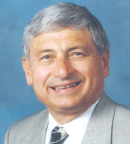
Philip J. DiSaia, MD
The grandson of Italian immigrants, Philip J. DiSaia was born on August 14, 1937, in Providence, Rhode Island. He earned his Bachelor’s in Science at Brown University and his MD at Tufts University. Upon the advice of his mentor in medical school, Dr. DiSaia obtained 2 years of general surgery training, followed by a residency in obstetrics and gynecology at Yale University, where he met Edward J. Quilligan, MD, creator of the fetal heart rate monitor.
During his residency, Dr. DiSaia published the paper that first brought to light the teratogenic effects of warfarin on the human fetus. He next fulfilled his commitment to serve in the U.S. Navy and then successfully competed for a grant through the American Cancer Society, which funded his fellowship in gynecologic oncology under the tutelage of Felix Noah Rutledge, MD, at MD Anderson Hospital and Tumor Institute in Houston. During this period, he would form long-lasting bonds with his co-fellow, Dr. William T. Creasman.
Dedicated to Women’s Health
In 1976, Dr. DiSaia was recruited following a national search for a Chair for the Department of Obstetrics & Gynecology at the University of California (UC), Irvine. Accompanied by Dr. Quilligan, Dr. DiSaia sought to establish a traditional academic department at UC Irvine and would ultimately distinguish the Department of Obstetrics & Gynecology as one of the preeminent institutions dedicated to women’s health.
In addition to a nationally recognized residency program and robust volunteer clinical faculty comprising community obstetricians/gynecologists, the department flourished under his leadership with the establishment of four clinically directed and research-driven divisions in Gynecologic Oncology, Maternal-Fetal Medicine, Reproductive Endocrinology and Infertility, and Urogynecology. Embedded in each division was a highly sought after fellowship training program. Dr. DiSaia established the first 4-year program in gynecologic oncology, created a direct corridor for translational research collaboration with the basic scientists in UC Irvine’s School of Biological Sciences, and was the first to obtain National Institute of Health funding through a T32 grant to fund the 2 research years of the fellowship.
Spearheaded Practice-Changing Clinical Trials
Dr. DiSaia has served as President of the Society of Gynecologic Oncology and President of the American Board of Obstetrics & Gynecology. During his four consecutive terms as Group Presiding Chair of the National Cancer Institute’s Gynecologic Oncology Group, Dr. DiSaia spearheaded the practice-changing clinical trials that established the role of adjuvant radiotherapy for early-stage high-risk endometrial cancer; chemotherapy for advanced/recurrent endometrial cancer; antiangiogenic therapy; and intraperitoneal chemotherapy for newly diagnosed advanced ovarian cancer, chemoradiation for locally advanced cervical cancer, antiangiogenesis therapy for recurrent/metastatic cervical cancer, and sentinel lymphatic mapping for early-stage vulvar cancer.
At UC Irvine, his research endeavors have focused on the immunology of tumor biology, the safety of estrogen replacement therapy among breast and endometrial cancer survivors, and the development of less-disfiguring surgical approaches for vulvar cancer. Dr. DiSaia’s and Dr. Creasman’s Clinical Gynecologic Oncology is the most widely read textbook in the subspecialty and is currently in its 9th edition. It has been translated into several languages.
Dr. DiSaia is the recipient of the University of California Gold Medal and a Certificate of Commemoration from the U.S. Senate. At the turn of the millennium, Dr. DiSaia was granted an audience with Pope John Paul II and shortly thereafter was granted an Honorary Degree from the University of Brescia in the region of Lombardy in northern Italy. Dr. DiSaia’s legacy lives in the hearts of the numerous residents and fellows he has trained over the past 42 years at UC Irvine. During this period, he eased the suffering and/or cured thousands of women who struggled with gynecologic malignancies. He loved old medical tomes, the New England Patriots, and Italian wines.
Dr. DiSaia passed away peacefully at his home on Thursday, September 27, 2018. He is survived by his loving wife, Patti DiSaia, four sons and their wives, and numerous grandchildren.
This tribute was reprinted with permission from Krishnansu S. Tewari, MD, and the Society of Gynecologic Oncology. More tributes to Dr. DiSaia may be found at www.sgo.org/about-sgo/history/phil-disaia.

